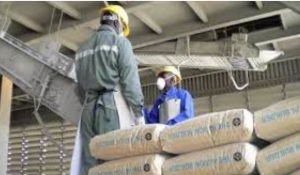How to Start Cement Business in Nigeria
Are you looking to start a cement business in Nigeria, but don’t know how to go about it?
If yes, you’ve come to the right place!
Cement business is very lucrative in Nigeria for good reasons and people doing this business are seriously cashing out.
Nigeria is a country with over 200 million citizens and almost every day, new building structures are been constructed.
And of course, cements are needed for this building construction.
So have you seen why cement business is very lucrative in Nigeria?
If you want to tap into the cement business, it is not yet too late to start.
See, let me tell you, it is not just about starting a business with huge capital.
If you don’t have a clear business strategy, your business will surely struggle and cement business is no exceptional.
You need to first understand how cement business works before venturing into it.
When you have a good understanding of how the business model works, it will be easier for you to scale through.
If you have been wondering how you can successfully start your own cement business in Nigeria, worry no more!
In this article, I will show you how to start cement business in Nigeria.
Ready? Let’s go!
Also Read: How to Start a Boutique Business in Nigeria
How to Start Cement Business in Nigeria
To successfully start a cement business in Nigeria, follow these steps:
1. Research the Market

Market research is a crucial step when starting a cement business in Nigeria.
It’s like taking a deep dive into the construction industry to understand the demand, competition, and potential customers.
You want to know where the opportunities lie, right?
By researching the market, you can identify the target market for your cement business.
It’s like finding out which areas and customer segments have the highest demand for cement in Nigeria.
This helps you focus your efforts and resources in the right direction.
You also get to learn about your competitors.
You can studyother cement manufacturers, distributors, and suppliers in your neighborhood.
This way, you can see what they’re doing, how they’re pricing their products, and how they’re reaching customers.
This knowledge helps you find unique ways to stand out and beat the competition.
Market research also gives you insights into customer preferences and needs.
You can talk to potential customers, ask them what they look for in cement, and understand their price sensitivities.
This helps you tailor your products and marketing messages to meet their specific needs.
Lastly, market research helps you forecast the demand for cement in Nigeria.
By analyzing historical data, construction trends, and economic indicators, you can estimate the future demand for cement.
This way, you can plan your production capacity and ensure you don’t run out or have excess supply.
Ultimately, market research is like having a map that guides you through the Nigerian cement market.
It helps you make informed decisions, develop effective strategies, and position your business for success.
2. Write a Business Plan

A business plan is like a guiding star when starting a cement business in Nigeria.
It’s like having a blueprint that outlines your goals, strategies, and financial projections.
Let’s dive into why a business plan is so important:
First off, a business plan helps you map out your journey and set clear objectives.
It makes you think about your target market, the types of cement you’ll offer, how you’ll price them, and how you’ll reach customers.
By having a plan in place, you can stay focused and work towards achieving your goals.
Secondly, a well-crafted business plan is crucial for getting funding.
It shows potential investors or lenders that you’ve done your homework and understand the market.
You’ll want to include financial projections, like how much money you need to get started, when you expect to make a profit, and how you’ll manage risks.
A solid business plan increases your chances of getting the necessary funding to kick-start your cement business.
Furthermore, a business plan helps you anticipate challenges and find solutions.
It forces you to analyze the market, competition, and regulations.
By identifying potential hurdles early on, you can come up with backup plans to overcome them.
This way, you’re prepared to handle any obstacles that come your way.
Lastly, a business plan keeps you on track and adaptable.
It’s a reference point you can turn to as your cement business grows.
You can measure your progress, make adjustments based on market changes, and make informed decisions to keep your business thriving.
Overall, a business plan is your trusty companion when starting a cement business in Nigeria.
It helps you set goals, secure funding, tackle challenges, and stay focused on your path to success.
3. Understand the Legal Requirements

Understanding the legal requirements when starting a cement business in Nigeria is like ensuring you’re on the right side of the law.
Let me break it down:
First things first, you’ll need to register your business with the Corporate Affairs Commission (CAC) in Nigeria.
It’s like giving your business an official identity and making it legit.
You’ll provide details like your company name and shareholders’ information.
Next up, you need to obtain licenses and permits.
Think of it as getting the necessary permissions to operate.
You’ll need to comply with specific regulations for the cement industry, environmental standards, and health and safety rules.
It’s always a good idea to consult legal experts to ensure you’re meeting all the requirements.
Don’t forget about securing land for your cement plant!
You’ll need to acquire or lease land that complies with land use regulations.
Take the time to do your research and find a suitable location.
Taxation is also part of the game.
Register for tax purposes, get your tax identification numbers, and understand your obligations for corporate income tax, VAT, and other applicable taxes.
Keep your financial records in order and file your tax returns on time.
Employment laws are important too.
Make sure you understand the labor laws in Nigeria, like minimum wages, employment contracts, and employee benefits.
Taking care of your workforce is crucial.
Lastly, be aware of industry-specific regulations and standards for cement production, packaging, labeling, and quality control.
It’s all about ensuring the safety and quality of your cement products.
By staying on top of the legal requirements, you can build a solid foundation for your cement business in Nigeria.
It keeps you compliant, reduces legal risks, and helps you run a successful and sustainable operation.
Remember, legal advice is your best friend in navigating the legal landscape!
Recommended: How to Start POS Business in Nigeria
4. Source Capital
Sourcing capital for your cement business in Nigeria is like finding the money to make your dreams come true.
Let me break it down:
Starting a cement business requires a good chunk of cash.
You’ll need funds for things like buying or leasing land, getting machinery, hiring workers, marketing, and day-to-day operations.
That’s where sourcing capital comes in.
There are different ways to get the funds you need.
You can dip into your personal savings or ask family and friends to invest in your venture.
Banks can also lend you money specifically for business purposes.
Just make sure you have a solid business plan and financial projections to convince them.
If you’re feeling adventurous, you can look for venture capital firms or angel investors.
These folks provide money in exchange for a piece of your business.
It’s like having a partner who believes in your potential.
Partnering with existing players in the cement industry is another option.
They can bring in capital, expertise, and even help with distribution.
In return, you might have to share ownership and profits, but it’s a win-win situation.
Don’t forget to explore government grants, subsidies, or loan programs aimed at supporting entrepreneurs.
They might have special funds for your industry.
Lastly, crowdfunding platforms allow you to pitch your business idea to the public and gather financial support from individuals who believe in your vision.
Remember, sourcing capital is all about finding the right funding avenue that suits your needs and goals.
It’s like turning your dreams into reality with the necessary funds.
5. Choose the Right Location
When it comes to starting a cement business in Nigeria, choosing the right location and having the right infrastructure is like setting the stage for success.
Let’s dive in:
First off, finding the perfect location for your cement plant is crucial.
You want a spot that’s close to where the raw materials, like limestone and clay, can be easily sourced.
This helps keep transportation costs low and ensures a steady supply of materials.
Plus, being near major construction markets means you can quickly distribute your cement products where they’re needed most.
Speaking of distribution, having good infrastructure is a game-changer.
Reliable electricity is a must for running your machinery smoothly, while access to water is essential for the production process.
And let’s not forget about road connectivity!
Having well-developed roads makes it easier to transport raw materials to your plant and deliver the finished products to customers across the country.
Don’t overlook the importance of skilled labor.
Choosing a location with a pool of experienced workers, like engineers and technicians, can save you time and money on training.
It’s also important to consider the regulatory environment.
You want to ensure that your chosen location complies with environmental regulations and permits necessary for cement production.
Getting the necessary approvals and support from the local government can make your business journey smoother.
By carefully selecting the right location and having the necessary infrastructure in place, you set yourself up for success in the Nigerian cement business.
It’s like laying a strong foundation that helps you optimize costs, secure raw materials, efficiently distribute your products, and create a favorable operating environment.
Doing thorough research and seeking advice from industry experts will guide you in making the best choices for your business.
6. Raw Materials
Raw materials are like the building blocks of your cement business in Nigeria.
They’re the secret sauce that makes your cement top-notch.
Let’s dig into why they’re so important:
First off, you need limestone, clay, and gypsum to make your cement.
Limestone brings in the calcium, while clay and gypsum add that special touch to the chemical composition and setting properties.
Getting a steady and reliable supply of these raw materials is key.
You’ll want to find areas with abundant reserves of limestone and clay.
It’s like finding hidden treasure!
Being close to the source saves you transportation costs and ensures you never run out of raw materials.
But it’s not just about quantity; quality matters too.
Test and analyze your raw materials to make sure they meet the right standards.
You want high-quality stuff to produce top-notch cement.
Think sustainability too! Consider how you extract the raw materials and their impact on the environment.
Make sure you comply with regulations and adopt responsible sourcing practices.
It’s all about being green and ethical.
And let’s not forget about efficiency.
Explore ways to optimize raw material usage and production processes.
Blending different types of limestone and clay can work wonders in making your cement cost-effective and high-performing.
By nailing the raw materials aspect, you’re building a solid foundation for your cement business.
You’ll have a steady supply of top-quality materials, meet market demands, and deliver cement that exceeds expectations.
It’s all about finding the perfect ingredients for success!
7. Machinery and Equipment
Machinery and equipment are like the superheroes of your cement business.
They’re the powerhouses that make everything happen.
Let’s dive into why they’re so crucial:
First off, you’ll need a bunch of cool machines.
Crushers, mills, kilns, conveyors, and packaging machines are like the Avengers of cement production.
They crush, grind, heat, and package your raw materials into the final cement products.
When it comes to choosing your machinery and equipment, there are a few things to consider.
Look for machines that can handle the amount of cement you plan to produce and meet the required quality standards.
You want reliable workhorses that won’t let you down.
Budget is important too.
You don’t want to break the bank, but remember that quality and durability are worth the investment.
Nobody likes a machine that breaks down all the time, causing production delays.
Don’t forget maintenance! It’s like giving your machines a spa day.
Regular inspections, repairs, and replacements of parts keep them running smoothly.
Make sure you have a solid maintenance plan in place.
Customer service is crucial. Choose machinery from reputable suppliers who offer good after-sales support.
You want to be able to rely on them when you need assistance or spare parts.
Technology is your friend. Explore advanced options and automation.
They can boost efficiency, reduce manual work, and improve product quality.
By investing in the right machinery and equipment, you’re setting yourself up for success in the Nigerian cement business.
They’re like the superhero squad that ensures efficient production, top-notch quality, and smooth operations.
So choose wisely and let the machines work their magic!
8. Workforce
The workforce is like the heart and soul of your cement business.
They’re the real superheroes who bring your operations to life.
Let’s dive into why they’re so important:
First off, you need a team of skilled and dedicated folks to make things happen.
From engineers and production experts to salespeople and administrators, each role plays a crucial part in the success of your business.
Consider the availability of talent in the region where you’re setting up shop.
Look for areas with a pool of skilled workers or be ready to provide training to boost their expertise.
You can team up with technical institutions or offer on-the-job training to equip your workforce with the necessary skills.
Safety and employee welfare are crucial too.
Provide a safe working environment, follow labor laws, and offer competitive compensation packages to attract and retain top talent.
Show your employees that you care about their well-being.
Building a positive work culture is key.
Encourage open communication, recognize and reward achievements, and provide opportunities for growth within your organization.
When your team feels valued and motivated, they’ll go above and beyond to make your cement business thrive.
Diversity matters too! Embrace different backgrounds and perspectives.
It brings fresh ideas and promotes innovation.
By assembling a skilled and motivated workforce, you’re setting yourself up for success in your cement business.
Their expertise, dedication, and teamwork drive the efficiency of your operations, ensuring top-notch production, quality products, and happy customers.
Take care of your team, and they’ll take care of your business.
Also See: How to Start Soft Drinks Business in Nigeria
9. Production and Quality Control
Production and quality control are like the dynamic duo of your cement business.
They ensure you create top-notch cement that customers will love.
Let’s dive into why they’re so crucial:
First off, you need a well-oiled production system.
It’s all about using your machinery efficiently, following standardized processes, and making the most of your raw materials.
Think of it as a dance where everything flows smoothly.
You want to meet market demands while keeping costs in check.
But here’s the secret sauce: quality control.
It’s like having a superhero with a magnifying glass.
You need to make sure your cement meets all the required standards and specifications.
Regular testing and analysis at every stage, from raw materials to the final product, are key.
This helps catch any quality issues and fix them pronto.
Investing in a state-of-the-art laboratory is a game-changer.
It’s like having a secret lab where you test the strength, durability, and chemical composition of your cement.
Meeting national and international quality standards boosts customer confidence and sets you apart from the competition.
Don’t forget about the environment! Sustainable practices like energy efficiency, proper waste management, and controlling emissions are essential.
It’s all about being eco-friendly and complying with environmental regulations.
By nailing production and quality control, you’re ensuring your cement business stands out.
Your customers will get consistent, high-quality cement that they can rely on.
So, streamline your production, be a quality control detective, and show some love to the environment.
That’s how you make a mark in the cement industry!
10. Distribution and Marketing
Distribution and marketing are like the dynamic duo that brings your cement business to life.
They ensure your cement reaches the right people and that everyone knows about it.
Let’s dive into why they’re so important:
First off, distribution is like the superhero that gets your cement from the factory to the customers.
You need a solid network of distributors who know the construction industry inside out.
They’ll help you reach retailers, contractors, and other potential customers all across the country.
But wait, there’s more! Marketing is the secret ingredient that creates buzz around your cement.
It’s all about getting the word out, building a strong brand, and enticing customers to choose your cement.
Think digital marketing, social media, advertising, and all the cool ways to showcase your products.
Understanding your customers is key. What do they want? What do they value?
Highlight the unique features and benefits of your cement that set it apart from the competition.
Build relationships, provide great customer service, and keep them coming back for more.
Don’t forget to keep an eye on the market and your competitors.
Stay ahead of the game by adapting your distribution and marketing strategies to meet changing trends and customer demands.
By getting your distribution and marketing game on point, you’re ensuring that your cement business thrives.
You’ll reach your customers, make your brand known, and boost those sales.
So, partner up with the right distributors, get creative with marketing, and watch your business grow!
11. Monitor and Improve
Monitoring and improving are like the secret ingredients that keep your cement business thriving.
They help you stay on top of your game and continuously make things better.
Let’s dive into why they’re so important:
First off, monitoring is like having a radar that keeps an eye on everything.
It’s all about tracking how well your business is doing.
Keep an eye on production, quality control, distribution, and what customers are saying.
By analyzing all this data, you’ll uncover valuable insights into your operations.
But here’s the cool part: improvement.
It’s like having a superhero cape that helps you level up.
Look for areas where you can do better.
Maybe it’s optimizing your production process, enhancing product quality, or finding ways to make distribution even smoother.
Seek feedback from your team and customers to identify opportunities for growth.
Embrace a culture of continuous improvement.
Encourage innovation, problem-solving, and out-of-the-box thinking.
Stay up-to-date with industry trends and technology advancements.
Don’t be afraid to explore new ideas and invest in research and development.
Collaborate with industry experts, attend conferences, and never stop learning.
By staying ahead of the curve, you’ll keep your cement business ahead of the competition.
Regularly review your business plan and adjust it as needed.
Set goals and benchmarks to track your progress.
Celebrate milestones and use them as motivation to keep pushing forward.
Monitoring and improving are the secret sauce that propels your cement business.
Keep an eye on what’s happening, make smart improvements, and watch your business soar to new heights!
Recommended: How to Start Foodstuff Business in Nigeria
How Much Can I Use to Start a Cement Business in Nigeria?
The capital needed to start a cement business in Nigeria can vary depending on the size and scope of your operation.
While I can’t give you an exact amount without specific details, I can give you a rough idea.
For a small-scale cement business, you should budget several million to tens of millions of Naira.
This would cover expenses like acquiring or leasing land, setting up facilities, purchasing machinery and equipment, securing raw materials, marketing and promotion, licenses and permits, and initial working capital.
If you’re thinking bigger with a medium or large-scale cement business, the capital requirement could increase significantly.
You might be looking at tens of millions to hundreds of millions or even billions of Naira.
This would involve higher production capacities, extensive infrastructure development, advanced machinery, and a broader market reach.
To get an accurate estimate, it’s important to develop a detailed business plan and conduct a thorough financial analysis.
This will help you identify the specific expenses and give you a clearer picture of the investment needed.
Remember, there are various financing options available, such as bank loans, partnerships, and investor funding.
Additionally, keep an eye out for government or non-governmental organizations that offer funding programs or grants for small businesses in Nigeria.
By conducting proper research and seeking professional advice, you’ll be able to determine the right amount of capital required to kick-start your cement business adventure.
Also Read: Top 20 High Income Skills in Nigeria
Is Cement Business Lucrative in Nigeria?
Cement business in Nigeria can be a highly lucrative venture.
Nigeria’s construction industry is booming, and the demand for cement is constantly on the rise.
This is mainly due to the country’s growing population and the need for housing, commercial buildings, and infrastructure projects.
With a large population and urbanization trends, Nigeria presents a promising market for cement.
The government’s focus on infrastructure development further boosts the demand for cement products.
The construction of roads, bridges, power plants, and other infrastructure projects creates a consistent need for quality cement.
One exciting aspect is that the number of cement manufacturers in Nigeria is relatively limited.
This means there’s a great opportunity for businesses to enter the market and capture a significant share.
With the right strategies in place, you can establish your brand, build a strong customer base, and generate substantial profits.
Of course, success in the cement industry requires careful planning, effective management, and a commitment to delivering quality products.
Understanding customer preferences, investing in marketing and distribution, and staying ahead of the competition are vital.
While challenges exist, such as fluctuating raw material costs and regulatory compliance, the potential for profitability in the cement business in Nigeria is undeniable.
By tapping into the growing construction market and providing reliable cement solutions, you can pave the way to a successful and lucrative business venture.
Also See: How to Start Laundry Business in Nigeria
Frequently Asked Questions (FAQ)
Can I Start a Cement Business with ₦200,000 in Nigeria?
Well, it might be quite challenging.
That amount may not cover crucial expenses like land, equipment, and permits.
Plus, buying an initial stock of cement could be difficult.
To set up a successful business, it’s advisable to consider alternative options or seek additional funding.
A higher capital investment would give you a stronger foundation.
Don’t lose hope though, explore your options and find the best path forward!
How to Become a Cement Dealer in Nigeria?
If you want to become a cement dealer in Nigeria, here’s what you can do.
Start by doing some market research to understand the demand and competition.
Then, register your business with the Corporate Affairs Commission (CAC) and get all the necessary permits and licenses.
Find a good location for your cement store and make sure you stock up with enough cement.
Build relationships with cement manufacturers and wholesalers for a reliable supply.
Lastly, promote your business through advertising, word of mouth, and online platforms.
Provide top-notch customer service to keep customers coming back.
Which Is the Largest Cement Company in Nigeria?
That would be none other than Dangote Cement.
They’ve been around since 1992 and have become a powerhouse in the industry.
With multiple cement plants all over the country, they can produce over 45 million metric tons of cement every year.
People know them for their top-notch quality and their strong market presence.
Dangote Cement has played a big role in Nigeria’s infrastructure development and continues to be a leading player in the cement sector.
Which Brand of Cement Is the Best in Quality in Nigeria?
Are you wondering which brand of cement is the best in quality in Nigeria?
Well, when it comes to the best quality cement in Nigeria, you can’t go wrong with Dangote Cement.
They’ve built quite a name for themselves!
Dangote Cement is known for its exceptional standards and reliable products.
They make sure to follow strict quality control measures, so you can trust the consistency and durability of their cement.
With their focus on innovation and advanced technology, they’ve become the go-to choice for many who want top-notch cement in Nigeria.
How Many Blocks Can 1 Bag of Cement Lay in Nigeria?
Well, it varies depending on a few things.
Generally, you can expect to lay around 30 to 35 blocks of size 9 inches by 9 inches by 18 inches with one bag of cement.
But keep in mind, factors like block size, the thickness of mortar joints, and how the work is done can affect the actual number.
It’s always best to consult a professional or check the manufacturer’s recommendations for accurate calculations based on your specific project.
Recommended: 20 Easiest Jobs to Get After Graduation in Nigeria
Video Section
Conclusion
Cement business is very lucrative in Nigeria and this is the best time to tap into this industry considering the growing population of Nigeria.
However, while starting a cement business in Nigeria is a good idea, you can still run into loss if you don’t have a clear business strategy.
The difference between a successful business and a failed business is business strategy.
Before starting out, you have to first map out how you want your business to be.
However, with this article, everything is much simpler for you.
By following all the tips I have shared with you in this article, you can successfully start your own cement business in Nigeria and be on your way to generating massive profits.
If you have any questions or inquiries, kindly drop them in the comment section and I will respond as soon as possible.
Good luck!
Related Posts:
- 28 Easiest Handworks to Learn in Nigeria
- 10 Things to Do After Graduation in Nigeria
- How to Build a Successful Career as a Nigerian Graduate
- 10 Key Differences Between Universities and Polytechnics in Nigeria
- How to Improve Your Public Speaking Skills as a Nigerian Student
- How to Improve Your Writing Skills as a Nigerian Student
- How to Write a Winning Scholarship Essay as a Nigerian Student
- What Causes Failure in WAEC in Nigeria? (Top 20 Reasons)
- 10 Steps for Writing WAEC Informal Letter
- 28 Tips on How to Score A1 in WAEC as a Nigerian Student




